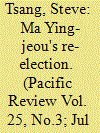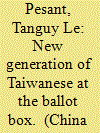| Srl | Item |
| 1 |
ID:
113722


|
|
|
|
|
| Publication |
2012.
|
| Summary/Abstract |
Ma Ying-jeou's re-election means that there will not be a leadership change in Taiwan, but it still has significant implications. It forces the opposition Democratic Progressive Party (DPP) to work out a succession for itself and confront the political reality that it must now persuade voters in Taiwan that it can manage relations with mainland China effectively in order to win the presidency again. It also requires Ma to define clearly the limits of his mainland policy in order to minimize Beijing's expectations of his second term, as no president of Taiwan can agree to move towards political integration without a popular mandate. On its part, Beijing has taken on board the significance of Taiwan's electoral cycle for managing cross-Strait ties and will put pressure on Ma to move forward over political integration and thus reduce the scope for a future DPP administration to reverse course. This notwithstanding, Beijing's Taiwan policy will ultimately be determined more by the result of the leadership succession in mainland China itself in the autumn of 2012. For USA and East Asia, Ma's re-election is a positive development as it minimizes the risk of a confrontation or a crisis across the Taiwan Strait. But it will not remove the main problems they have with China that are Taiwan related. For USA, arms sales to Taiwan will still be needed and will remain a source of tension with Beijing. For Southeast Asia, stability across the Taiwan Strait implies that Beijing can devote more attention and resources to the South China Sea territorial disputes and that it is likely to behave in a more assertive way.
|
|
|
|
|
|
|
|
|
|
|
|
|
|
|
|
| 2 |
ID:
113771


|
|
|
|
|
| Publication |
2012.
|
| Summary/Abstract |
The re-election of Ma Ying-jeou on 14 January 2012 was not as close as had been anticipated. This was in particular because he managed to win the support of some young voters, who at the beginning of the campaign were massively in favour of Tsai Ing-wen. In order to highlight the reasons why Taiwanese in the 20-to-29 age bracket changed their minds, this article analyses their perception of the two candidates, their main preoccupations, and their position in relation to the main themes of the campaign: the economic and social situation, identification with Taiwan, the island's international status, and relations with China.
|
|
|
|
|
|
|
|
|
|
|
|
|
|
|
|
| 3 |
ID:
108355


|
|
|
|
|
| Publication |
2011.
|
| Summary/Abstract |
Why did the unified government led by Taiwan's president Ma Ying-jeou experience gridlock? In this article, I answer this question by modifying the veto player theory to explain how policies are made in Taiwan's semipresidential system, in which the president can unilaterally appoint a premier who is accountable to the national legislature. Given this constitutional design, the premier represents the president rather than the legislature, so the agenda setter is either the legislature or the president. A veto player model shows that the legislature, as a collective veto player, has the last-mover's advantage when it sets the agenda and that the two executive heads are more likely to be in congruent if a policy has to be deliberated by the legislature. The president sets the agenda only if he can discipline the legislators in his party and the legislature is not allowed to amend an executive proposal. This theory explan is why policies involving lawmaking give Taiwan's Legislative Yuan considerable bargaining powers, even to the disadvantage of the president. These theoretical arguments are confirmed by hypothesis-based case studies and can be generalized to study other semipresidential regimes.
|
|
|
|
|
|
|
|
|
|
|
|
|
|
|
|